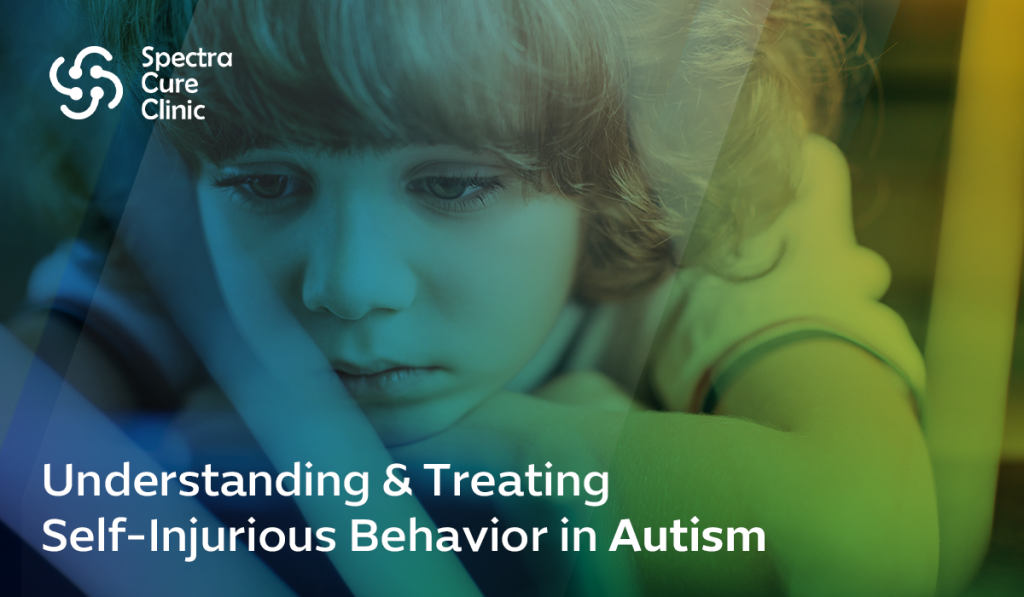
Understanding & Treating Self-Injurious Behavior in Autism
Self-injurious behavior (SIB) is a challenging and distressing symptom commonly observed in
individuals with autism spectrum disorder (ASD). These behaviors, which involve physically
harming oneself through actions like hitting, biting, or head-banging, can significantly impact a
person’s well-being and quality of life. Understanding the underlying causes of self-injury and
developing effective treatment strategies are essential for supporting individuals with autism in
managing these behaviors. Approximately half of individuals with autism experience self-injurious behavior at some point in
their lives, and it can impact people of all ages.
Signs of Self-Injury in Individuals with Autism
Self-injurious behaviors can manifest in various ways, including:
- Head banging, hitting, or rocking the head
- Biting or squeezing hands, pinching, or hitting objects
- Pinching or scratching the skin
- Probing or touching sensitive areas of the body
Communicating Through Self-Injurious Behaviors
- For individuals with autism, self-injurious behaviors can sometimes serve as a form of communication when they have no other way of expressing their needs, wants, or feelings. For example, head-slapping or banging the head on a hard surface may be their way of expressing frustration, seeking attention, or communicating that they are overwhelmed. Similarly, hand biting might be used to cope with anxiety or excitement, providing a sense of relief in moments of emotional intensity. Skin picking could be a response to boredom or a lack of stimulation. Ear slapping or head banging might indicate discomfort or pain, serving as a way for the individual to express that something hurts or doesn’t feel right. These behaviors, while distressing, often have a deeper meaning and are ways the individual tries to communicate when they lack the tools or language to do so effectively
These behaviors are often linked to:
- Impaired Methylation Cycle: When the methylation cycle doesn’t function properly, it leads to an imbalance in brain neurotransmitters. This disruption makes it difficult for the brain to process sensory signals, resulting in overwhelming sensations and discomfort.
- Gut-Related Pain: Many children with autism engage in self-injurious behaviors due to pain, particularly from their gut. Digestive discomfort or issues in the gastrointestinal system can trigger these behaviors as a coping mechanism for the pain.
- Adrenal Malfunction: The body’s fight-or-flight response can be triggered by pain or stress. Children may experience physical reactions such as increased heart rate, sweating, or facial redness, similar to anxiety or worry. Imagine having that feeling constantly—24 hours a day, 7 days a week. This ongoing stress can lead to behaviors like self-injury as a way to manage or cope with the discomfort.
- Low dopamine and serotonin levels can have a significant impact, as these neurotransmitters are crucial for mood regulation. Imbalances in dopamine and serotonin can lead to emotional distress, contributing to self-injurious behaviors.
- Frustration often arises when an individual cannot express themselves, and this inability to communicate their needs or feelings can be very upsetting. This frustration may manifest as self-injury, as it becomes a way to release built-up tension.
- Seizures, including subclinical ones that may not always be visible, can lead to behaviors like hyperactivity, aggression, or destructive actions, such as breaking objects. These seizures disrupt normal brain activity and can cause physical discomfort, which the individual may express through self-injurious actions.
So, is self-injury simply a behavior associated with autism, or is there something deeper
happening? At Spectra Cure Clinic, we go beyond viewing self-injury as just a symptom of
autism. We focus on identifying the underlying causes and managing them in an individualized
manner, providing tailored treatment to address each child’s unique needs. By understanding
the root causes, we help children better cope with their challenges in a supportive and effective
way.
Post Views: 651

